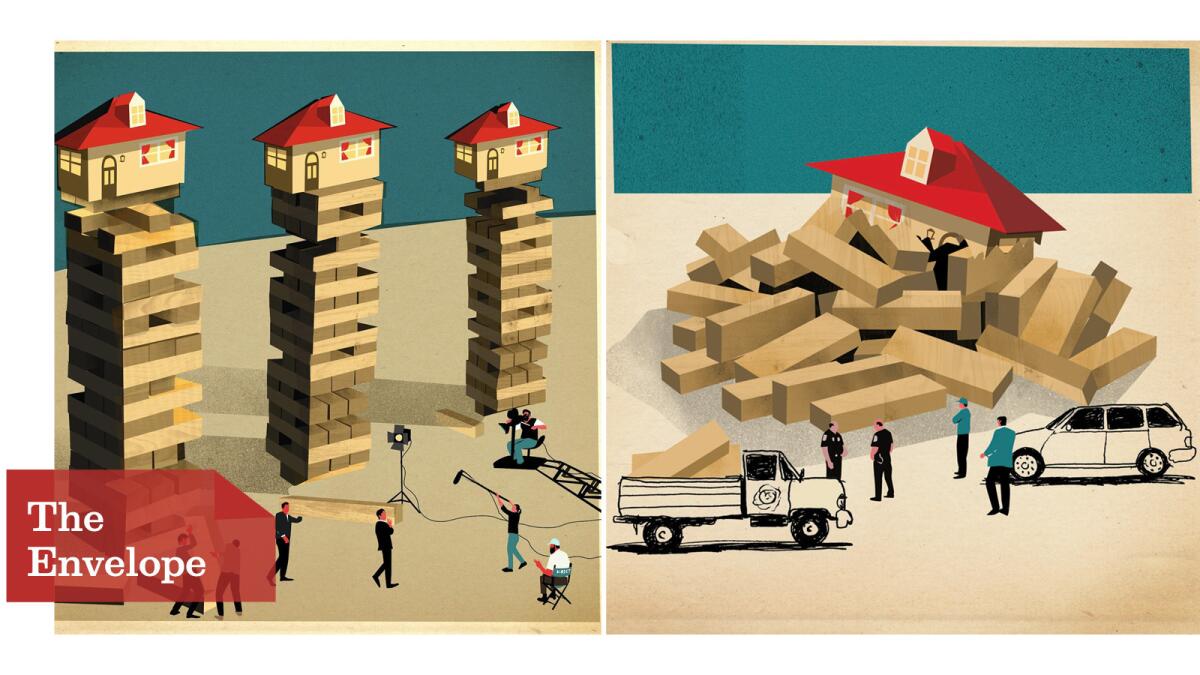The Envelope: ‘The Big Short’ and ’99 Homes’ tackle the 2008 financial crisis from boom to bust

- Share via
So-called “losing the farm” movies in 1984 yielded Academy Award nominations for lead actress winner Sally Field (“Places in the Heart”), Sissy Spacek (“The River”) and Jessica Lange (“Country.”) But Hollywood has been slow in responding to more recent hardships caused by the 2008 economic crash that cost some 8 million Americans their homes. Though the 2010 documentary “Inside Job” earned an Oscar for dissecting Wall Street dysfunction, not until this fall has a scripted drama tackled the subject — two times over. Two films this awards season, “The Big Short” and “99 Homes,” offer contrasting portraits showing both cause and effect of the subprime mortgage meltdown.
In the October release “99 Homes,” Michael Shannon delivers an Oscar-buzzed performance as a Florida real estate broker-turned-foreclosure profiteer. His Rick Carver evicts Frank Greene (Andrew Garfield) and his family from his house, then hires the unemployed construction worker to evict other families from their homes. “I didn’t want to make a film about Wall Street brokers,” says writer-director Ramin Bahrani. “We always see that side of the story about the sexy rich guys who have bankrupted the rest of us.” Instead, Bahrani in 2012 started delving into the grim world of evictions. “Nobody had made a feature film about the housing crisis and when I looked at the history of cinema, I went all the way back to the 1940 movie ‘Grapes of Wrath’ to find a scene where someone got evicted from their home.”
SIGN UP for the free Gold Standard newsletter >>

New York-based Bahrani made a series of research trips to Orlando, Fla., the East Coast epicenter of the housing collapse. There he met lawyers, spent time in foreclosure court and witnessed evictions. “I was startled to learn that all the real estate brokers carried guns because they were scared about who would be on the other side of the door when they said, ‘I’m coming to take your home away.’”
“99 Homes” brims with incidents drawn directly from Bahrani’s foreclosure ride-alongs. “Like you see in the film, some people would shoot guns out of their homes. Others destroyed their houses and skipped town leaving the sewage backed up. And the scene where they’re evicting the confused old man who has no place to go — all of that’s for real.”
As Bahrani drilled into Florida’s post-meltdown housing bubble over the course of a year, he realized his story needed to encompass the corrupt network of banks, courts, government agencies and illegal “bulk-buyers” who bought foreclosed properties at bargain basement prices. “There were so many scams going on that I decided to make a fast-paced thriller combined with a Faustian version of the housing crash story,” Bahrani says. “Michael Shannon’s character is the devil in this equation, but the real devil is the system that created him. When the housing crisis hit, brokers had to evict people for Fannie Mae, Freddie Mac and the banks because if they didn’t do it, someone else would. Then they’d be out of a job and living in a motel.”
Where “99 Homes” examines the aftershock caused by toxic assets, Adam McKay’s “The Big Short,” based on Michael Lewis’ nonfiction book, details how a handful of hedge fund managers predicted the implosion of garbage-loaded collateral debt obligations and profited from the crash. Christian Bale and Steve Carell play quirky outsiders betting against short-sighted traders flush with cash.
“Most of these guys on Wall Street didn’t care at all about the impact of their actions on regular people because they were making too much money,” McKay says. “The banks made billions of dollars in fees from trading mortgage bonds, so then the ratings agencies came on board to make their fees for giving high ratings to those bonds. And the FCC never stepped in because people from that agency often get hired by the banks.”
Initially focused on a numbers-driven reality defined by computer screen calculations, “Big Short” protagonists slowly come to grips with the impending disaster that will reap them bittersweet fortunes. McKay explains, “I wanted the structure of the movie to move these guys away from playing this investment game based on algorithms and take them to a human level that scares the crap out of them.”
“The Big Short” briefly intersects with working-class realities when a couple of Wall Street analysts visit Orlando and discover that real estate brokers are selling multiple properties at zero down payments to strip club performers simply to generate quick commissions. Buyer and seller alike seem oblivious to the adjustable interest rates that are, a few months down the road, destined to double or triple monthly mortgage payments and produce the devastation chronicled in “99 Homes.”
Neither the glossy “Big Short” nor the gritty “99 Homes” offer much light at the end of their cinematic tunnels. “To this day, the guys we portray in this movie are angry,” says McKay. “A couple of them don’t do trades anymore. One of them just took a 9 to 5 job, another stopped investing. These characters really believed in the free market, so when they discovered the whole system is rigged, it was like a kid being told there is no Santa Claus.”
More to Read
Sign up for The Envelope
Get exclusive awards season news, in-depth interviews and columnist Glenn Whipp’s must-read analysis straight to your inbox.
You may occasionally receive promotional content from the Los Angeles Times.









